

French business to gain from Brexit, but Frexit menaces
Vivien Pertusot, of the international relations think tank Ifri, said the Franco-British political relationship had never been defined by the European Union but is based on bilateral interests.


A week that will define Europe
In a few days’ time, the populist conservative Boris Johnson may well be on his way to becoming British prime minister. And the radical left Podemos movement could be close to the reins of power in Spain. There is the question of what role the current EU institutions — the Commission and the Parliament — might play in a new climate infused with Euro-wariness. “There’s a realization that Europe has changed much faster than its conservative, slow-moving institutional bodies,” said Vivien Pertusot.
Read the article.
After UK: Who's next curbing social benefits?
Vivien Pertusot appears in a news report by Euranet Plus looking at the section on social benefits from the deal found between the United Kingdom and the European Union.
Building Bridges Conversation Series - France & UK
This new episode of the Building Bridges Conversation Series is part of the "Building Bridges" project, which aims to foster debate on the future of the European Union and offer top quality analyses on how each member state perceives the EU. In this video, Vivien Pertusot, coordinator of the project, discusses with Dominique David from Ifri (France) and Anand Menon from King's College (UK).
Building Bridges Conversation Series - Ireland & the Netherlands
This new episode of the Building Bridges Conversation Series is part of the "Building Bridges" project, which aims to foster debate on the future of the European Union and offer top quality analyses on how each member state perceives the EU. In this video, Vivien Pertusot, coordinator of the project, discusses with Marie Cross from the Institute of International and European Affairs (Ireland) and Adriaan Schout from Clingendael (the Netherlands).


Great-Britain Whistle-Stop Tour of the EU
The consultations on Cameron’s demands were run with the EU members by the head of the European Council, Donald Tusk from Poland. Tusk wrote down what was said and sent a letter to London and other European capitals. The letter was quite peculiar, admits Vivient Pertusot, the head of the French Institute of International Relations (IFRI) in Brussels.
Building Bridges Conversation Series - Luxembourg & Spain
This new episode of the Building Bridges Conversation Series is part of the "Building Bridges" project, which aims to foster debate on the future of the European Union and offer top quality analyses on how each member state perceives the EU. In this video, Vivien Pertusot, coordinator of the project, discusses with Guido Lessing from the Centre d’études et de recherches européennes (Luxembourg) and Charles Powell from Real Instituto Elcano (Spain).

Semi-Mutual Defense: Europe’s Patchwork Response to Paris Attacks
The offer of active military support to France in Syria or in the Sahel by several European member states is likely to overshadow the absence of meaningful commitment from others. On balance, the picture will not be too disheartening for supporters of the EU: its foreign and security policy apparatus will not come out damaged, but only because it has not been properly tested.
Building Bridges Conversation Series - Bulgaria & Denmark
This new episode of the Building Bridges Conversation Series is part of the "Building Bridges" project, which aims to foster debate on the future of the European Union and offer top quality analyses on how each member state perceives the EU. In this video, Vivien Pertusot, coordinator of the project, discusses with Maja Kluger Rasmussen from Think Europa (Denmark) and Antoinette Primatarova from the Centre for Liberal Strategies (Bulgaria).
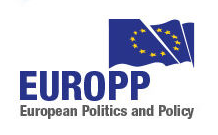

The French are looking for a fair deal for France and the EU, not just Britain
France has been ambivalent on the British renegotiation campaign. The general mood is to keep the UK in, but messages are going in different directions. Some are shrugging off the UK’s calls for reform and are not trying very hard to accommodate Westminster. Others seem keener to find an acceptable deal for Britain.
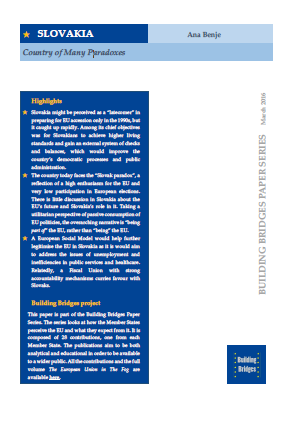
Slovakia: Country of Many Paradoxes
Slovakia might be perceived as a “latecomer” in preparing for EU accession only in the 1990s, but it caught up rapidly. Among its chief objectives was for Slovakians to achieve higher living standards and gain an external system of checks and balances, which would improve the country’s democratic processes and public administration.
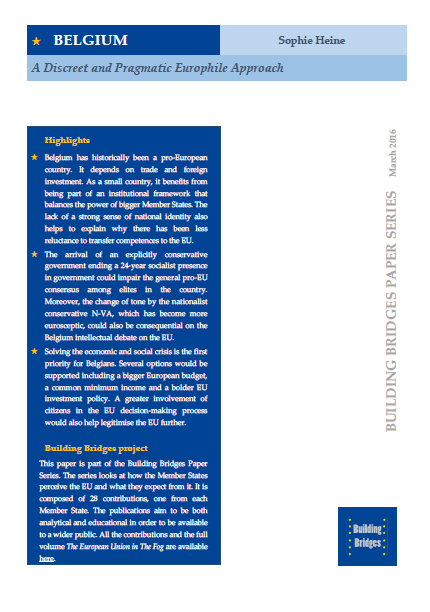
Belgium: A Discreet and Pragmatic Europhile Approach
Belgium has historically been a pro-European country. It depends on trade and foreign investment. As a small country, it benefits from being part of an institutional framework that balances the power of bigger Member States. The lack of a strong sense of national identity also helps to explain why there has been less reluctance to transfer competences to the EU.
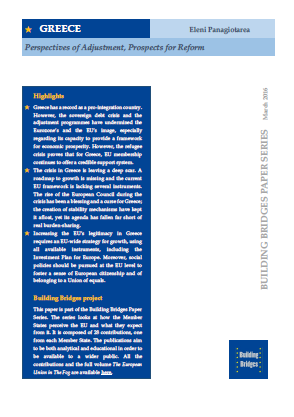
Greece: Perspectives of Adjustment, Prospects for Reform
Greece has a record as a pro-integration country. Yet, the sovereign debt crisis and the adjustment programmes have sapped the Eurozone’s and the EU’s image, especially regarding its capacity to provide a framework for economic prosperity. Still, the refugee crisis proves that EU membership continues to offer a credible support system within which it can expect economic aid, organisational backing and the protection of its borders.
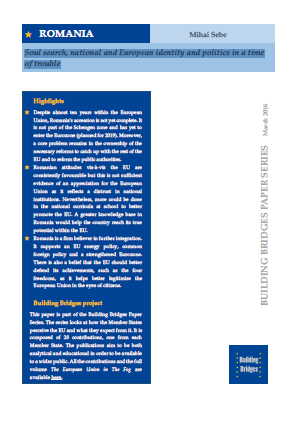
Romania: Soul Search, National and European Identity and Politics in a Time of Trouble
Despite almost ten years within the European Union, Romania’s accession is not yet complete. It is not part of the Schengen zone and has yet to enter the Eurozone (planned for 2019). Moreover, a core problem remains in the ownership of the necessary reforms to catch up with the rest of the EU and to reform the public authorities.
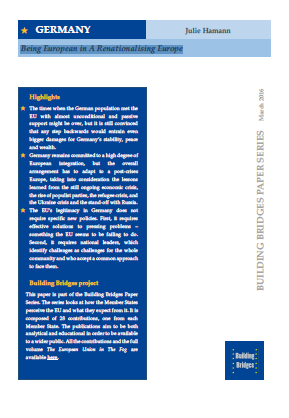
Germany: Being European in a Renationalising Europe
The times when the German population met the EU with almost unconditional and passive support might be over, but it is still convinced that any step backwards would entrain even bigger damages for Germany’s stability, peace and wealth.
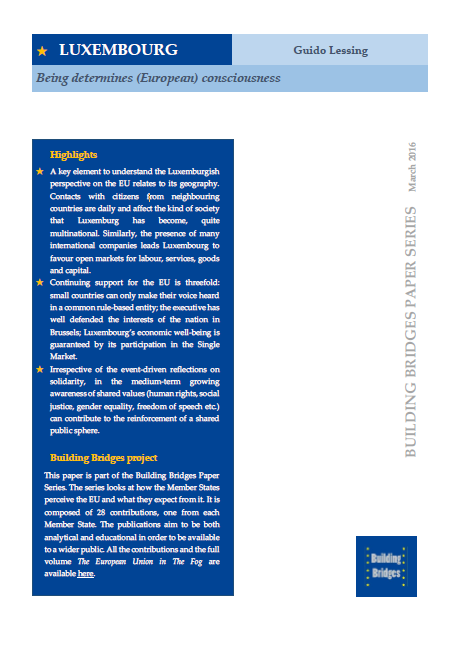
Luxembourg: Being Determines (European) Consciousness
A key element to understand the Luxembourgish perspective on the EU relates to its geography. Contacts with citizens from neighbouring countries are daily and affect the kind of society that Luxembourg has become, quite multinational. Similarly, the presence of many international companies leads Luxembourg to favour open markets for labour, services, goods and capital.
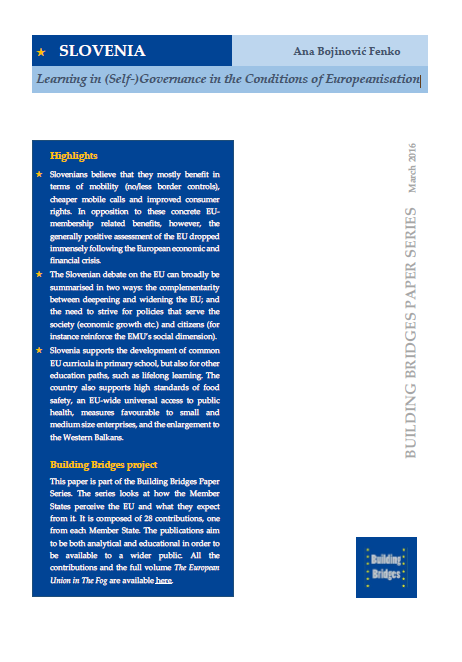
Slovenia: Learning in (Self-)Governance in the Conditions of Europeanisation
Slovenians believe that they mostly benefit in terms of mobility (no/less border controls), cheaper mobile calls and improved consumer rights. In opposition to these concrete EU-membership related benefits, however, the generally positive assessment of the EU dropped immensely following the European economic and financial crisis.
Rushing to a deal on the UK could be ill-thought-out for the EU
The European leaders are gathering this week to agree on a new settlement for the United Kingdom. The sudden peak of political interest, however, is coming late in the negotiations. The UK question has always been a European question despite the lackluster interest from European capitals. A failure to properly address the consequences of Britain remaining or leaving the EU would be very detrimental for the future of the Union.
Germany and the Eastern Partnership after the Ukraine Crisis
The conflict in and about Ukraine has catapulted the European Union's Eastern Partnership (EaP) into the limelight of international attention. Belittled as a bureaucratic and technical policy instrument, the European Neighbourhood Policy and the EaP as its Eastern regional dimension have within the course of a few months gained unexpected geopolitical significance.
Visions of EU Reform - Written evidence to the House of Lords
Vivien Pertusot provided written evidence to the inquiry of the EU Select Committee of the UK's House of Lords on "Visions of EU Reform". This inquiry is organised in the context of the UK Government's renegotiation and future referendum on the EU.
Support independent French research
Ifri, a foundation recognized as being of public utility, relies largely on private donors – companies and individuals – to guarantee its sustainability and intellectual independence. Through their funding, donors help maintain the Institute's position among the world's leading think tanks. By benefiting from an internationally recognized network and expertise, donors refine their understanding of geopolitical risk and its consequences on global politics and the economy. In 2024, Ifri will support more than 70 French and foreign companies and organizations.
















